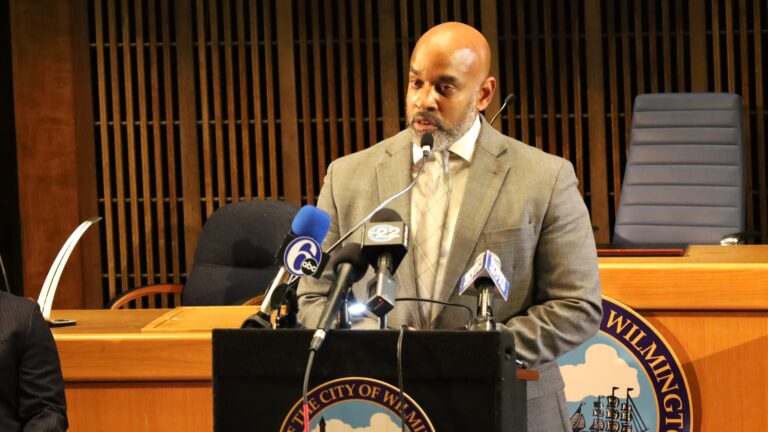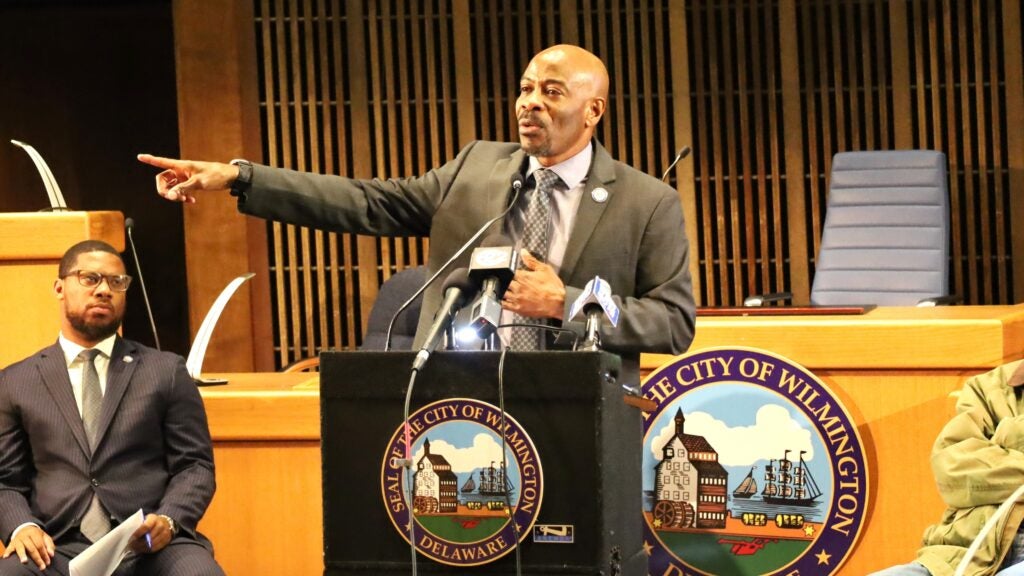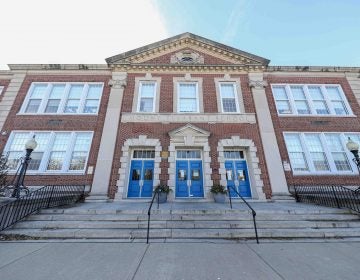‘Let’s go to war’: Wilmington officials propose educational advocacy office to improve student outcomes
City officials say the Office of Educational Advocacy would focus on the whole child and give City Council a voice it lost more than 40 years ago.
Listen 0:55
Wilmington City Council President Ernest "Trippi" Congo proposes an Office of Educational Advocacy that would report to the council and be a voice for the city's students at a press conference Wednesday, Jan. 15, 2025. (Sarah Mueller/WHYY)
From Philly and the Pa. suburbs to South Jersey and Delaware, what would you like WHYY News to cover? Let us know!
This story was supported by a statehouse coverage grant from the Corporation for Public Broadcasting.
Tired of an education system he says has let down Wilmington students, City Council President Ernest “Trippi” Congo said he plans to create an advocacy office to push for improved academic outcomes.
The Office of Educational Advocacy would report to the Wilmington City Council and serve all city students. It would focus on championing policies and legislative action at the local and state level that would focus on the whole child and helping them succeed.
“We cannot continuously be told that Wilmington cannot have a voice in the way our children are being educated,” he said. “We cannot continue to be told that we just can’t talk about what we know is necessary for our children to be successful.”
An ordinance expected to be considered by the council at its meeting Thursday night would create the office and allocate $110,000 for the director position. Phase one of the office is envisioned to include positions for the director, a consultant and an administrative assistant.
New Castle County education advocates trace the problems with city schools back to the trauma of 1970s desegregation efforts. Wilmington schools were desegregated in 1978 and students were bused past their neighborhood schools to ones in the suburbs. Activists say the city’s controversial busing plan marginalized community voices. Then three years later, Wilmington was split from having one district cover city schools, to four districts sharing parts of the city.
Wilmington High, the last traditional public high school in Delaware’s largest city, closed its doors more than 20 years ago. Since then, most city high school students have largely been bused to schools located miles outside the city.
The desegregation court order was lifted in 1995 and the Neighborhood Schools Act was approved in 2000. That legislation aimed to reduce the distances students traveled by assigning students to the public schools closest to their homes. But housing segregation and white flight over the years left city schools largely re-segregated.
State Rep. Nnamdi Chukwuocha, D-Wilmington, is pushing for council to create the education advocacy office. He says the four-school district model and state laws like the Neighborhood Schools Act have failed Wilmington children.
“It created an unfair mandate that created high needs, high poverty, racially identifiable schools, which are challenging, both for students, teachers, educators, parents, in order to navigate,” he said. “So we need to fix that.”

Chukwuocha said the office was the first step to Wilmington regaining its voice on educating its students.
“Let’s don these boots, this uniform, let’s pick up our weapons, and let’s go to war,” he said. “Because this is a war for our children, a war for the city of Wilmington, and I promise you we will win.”
A memo to council members from legislative research and policy director Kendra Brumfield-NaWandna argued the proposed office would not duplicate efforts of others working on education issues. Groups like the Redding Consortium and the Wilmington Learning Collaborative are focused on helping students attending school in the city, but the document argues the organizations don’t cover all city students and operate at the whim of state officials or various school boards.
The Redding Consortium is putting together a plan to redistrict Wilmington to remove schools in the Christina School District, which is based in Newark. Chukwuocha, who is a member of the Redding Consortium, said the group is preparing its final report to present to the state Board of Education and the General Assembly. A resolution adopted by state lawmakers last year supports the concept but acknowledges implementation may be years away.
Some Wilmington schools are among the worst performing in the state. Delaware Department of Education data from the 2022–2023 school year shows less than 7% of Bancroft School students were proficient in English and less than 4% were proficient in math. The Bancroft School was replaced last year by Maurice Pritchett Sr. Academy, the first new Wilmington school in 50 years. It was built by the state.

Get daily updates from WHYY News!
WHYY is your source for fact-based, in-depth journalism and information. As a nonprofit organization, we rely on financial support from readers like you. Please give today.








